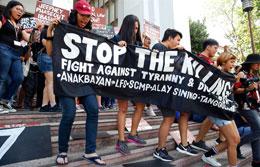“He is giving vigilantes a license to come after us”

Canadian human rights activists with links to the Philippines have expressed shock and anger as the country’s president Rodrigo Duterte declared that some of them have become "unwitting tools" of drug lords.
“He is giving vigilantes a license to come after us…human rights groups and foreign aid workers in the Philippines,” said a Filipino-Canadian migrant worker, who has rallied against Duterte’s war on drugs.
Declining to be named in fear of being targeted, the activist said the government of Canada should warn Duterte to stay away from Canadian aid workers and rights activists in the Philippines.
The move to connect drug lords to human rights workers and aid workers is reflective of Duterte’s overall stance against criticism and dissent, according to critics.
Some rights groups may have become "unwitting tools" of drug lords in the Philippines to undermine the president, Duterte’s spokesman said this week, a statement that Human Rights Watch said was "shameful" and risked provoking violence.
Rights groups have denounced President Rodrigo Duterte's bloody war on drugs in which thousands of people have been killed, either by police or by shadowy, unidentified gunmen.
Duterte, who says he must be tough to protect the people from the scourge of drugs, has criticised rights groups saying they were "trivialising" his campaign and unjustly blaming the authorities for bloodshed.
Drug lords have suffered huge financial losses since the campaign was unleashed 20 months ago and drug syndicates were trying to destabilise the government, the president's spokesman, Harry Roque, said in a statement.
"We therefore do not discount the possibility that some human rights groups have become unwitting tools of drug lords to hinder the strides made," Roque said, without naming any rights group.
Roque said attacks on the president's war on drugs had been "vicious and non-stop", echoing comments by Foreign Secretary Alan Peter Cayetano last week after he defended the policy at a UN human rights council meeting in Geneva.
Roque did not offer any evidence to support the suggestion that rights groups were being used by drug lords.' The anti-narcotics campaign has raised international alarm and drawn criticism from some UN representatives, including High Commissioner for Human Rights Zeid Ra'ad al-Hussein, who suggested recently that Duterte needed to see a psychiatrist.
Police say they have killed more than 4,200 drug suspects who were violently resisting arrest since the launch of the crackdown, which Duterte has vowed to pursue until he steps down in June 2022.
Several thousand more people have been killed by unidentified gunmen.
Police suspect many were victims of gang wars though activists believe vigilantes supporting the government campaign were responsible for many of the killings.
Brad Adams, Asia director of Human Rights Watch, criticised Roque's statement, and the earlier comment from Cayetano, as "shockingly dangerous and shameful".
"Are they trying to have death squads target human rights activists?" Adams asked in a statement.
"Cayetano and Roque provide no evidence. They should withdraw their comments immediately."
Presidential legal counsel Salvador Panelo said the Human Rights Watch's call for Cayetano and Roque to withdraw their statements was "misplaced".
Duterte said on March 14 the Philippines would pull out of the International Criminal Court more than a month after court prosecutors opened a preliminary inquiry into his drug war. Panelo said Duterte felt the ICC had become "a tool of oppression, a tool of harassment".
Earlier this month Filipino Women rights advocates targeted Duterte as they marched in rallies to celebrate Women’s Day.
Migrante-Alberta said, Duterte’s recent order to the military to shoot women guerrillas in their vaginas to render them “useless” is “a brazen show of disrespect and violence against women in general.”
When it’s the person in the highest office who “personifies misogyny by the language he uses to publicly harass, berate, mock and humiliate women, Migrante-British Columbia’s (BC) Women’s Organizing Committee said “it sets the tone in the Philippines, encouraging the local law enforcement and the military to follow suit.
Migrante-Alberta added that “it is a shame that it is no less than the government of the Philippines that does not implement International Humanitarian Law and instead encourages sexual violence and war crimes.” The group said they will they will join the fight “even against the most disrespectful and despotic leaders of the world.”
Other groups like Karapatan and Movement Against Tyranny have also strong Canadian connections. They have protested policies of the Duterte administration in public rallies that they described as “recipes” for a “full-blown dictatorship”.
The Philippines is often referred to as one of the most dangerous countries in the world to be a human rights defender. In 2017, Front Line Defenders said in its annual report that 80% of deaths of human rights defenders took place in 4 countries: Brazil, Colombia, Mexico, and the Philippines.
At least 4 human rights workers have been killed under the Duterte administration so far: Karapatan Negros Oriental coordinator Elisa Badayos, Bicol paralegal Edwin Pura, Catholic priest Father Marcelito Paez, and Moro human rights activist Billamin Turabin Hasan.






